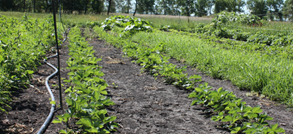
By
Mizhar Mikati
April 2024
Print Version
What you need to know
This research project investigates the social and economic conditions of what can be termed ‘small-scale ecological farming’ in Southern Manitoba. Encouraging and facilitating the operations of small-scale farmers who practice low-input, ecological and regenerative farming can be seen as important steps towards the production of food for local markets, sustainable food production, and the growth of local economies.
This research project utilizes in-depth semi-structured interviews with farm operators and other stakeholders, and a number of participant-led ‘farm-walks,’ to learn about and observe farmer motivations and experiences in sustaining their ecological farming operations. By combining lessons from agrarian food studies, literature on alternative food networks, and a political-economic analysis, this work examines the conditions of this kind of agrarian development.
Why this research is important
This research investigates pathways towards food production. One approach emphasizes the general trajectory of the agri-food sector: larger and more specialized farms and increased capital investments in new automated tools (e.g., ‘precision agriculture’), to name a couple, to encourage productive efficiency and yield. In contrast, another approach identified is by way of small-scale ecological farming and market gardens, which rely on more basic and relatively low-cost tools, tailor their production towards environmentally friendly practices, and encourage linkages to consumers and other avenues to increase revenue. Given the rising costs of production and land access barriers, this research investigates the latter approach of the experiences of small-scale ecological farmers, the reproduction of their operations, and the barriers in the market they or new farmers wanting to enter the sector may face.
How this research was conducted
Data for this research was collected through fifteen in-depth semi-structured interviews: ten interviews with farms and market gardens that produce food for the Southern Manitoba markets and five interviews with other stakeholders who have experience in this sector. Out of the ten farms/market gardens, seven were visited in person, where I undertook guided ‘farm walks’ to observe and learn about farm design, tools, and specific features and histories of the operation. Interview questions investigated the history and experience of different operations (e.g., access to knowledge, labour, capital) and the general outlook for small-scale, local and ecological farming.
What the researcher found
This research reverberates some of the general themes of critical political economic studies that highlight the contradiction based on market-based valuations and some of the normative goals of the broader alternative food movement. Experiences, motivations, opportunities, challenges, and risks varied and depended on the individual circumstances of the farms/market gardens. Producers were ideologically motivated to practice ecological farming and supply food for local markets and their overall lifestyle choices. Access to land can be a barrier (e.g., without support or means of purchase). In many cases, off-farm income was essential to starting or reproducing their operations. Educative endeavours, peer-to-peer and self-learning, and working & volunteering on other farms were important for many. These are labour-intensive operations, and labour needs varied depending on character, experience and years in operation. New emerging machinery and tools deemed as precision agriculture are inaccessible, cost prohibitive, and inappropriate for their practices, being designed mainly for larger farms; other means to increase productivity were sought and utilized. Support is important, and a sentiment of the importance of cooperative activity was expressed in a number of interviews.
How this research can be used
This research will contribute to research on local food and agriculture in the Canadian context. From situating the experiences of these operators within a generalized discussion of the market-based mechanisms for food production, it is hoped that these research results can be utilized to inform researchers, students, and those involved in the local food movement of the diverse experiences and characteristics of small-scale ecological farmers.
Acknowledgements
I would like to thank the research participants who took the time to share their experiences. This research was supported by the Brandon University Research Committee New Faculty Research Grant.
About the Researcher
Keywords
- ecological farming
- local food
- market gardens
- small-scale farming
Editor: Christiane Ramsey
Read more BU Research
Research at Brandon University follows comprehensive policies designed to safeguard ethics, to ensure academic integrity, to protect human and animal welfare and to prevent conflicts of interest.

